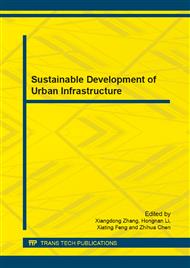p.114
p.126
p.130
p.136
p.143
p.147
p.151
p.157
p.162
Exploration on the Impact of Traditional Chinese Philosophy on Urban Planning in Ancient China
Abstract:
The political system in ancient China based upon Confucian philosophy and the advocation of Taoist philosophy once had profound influence on the urban planning and construction in ancient China, and a relatively complete urban planning and construction system had been developed accordingly. Under the “ritual system” in Confucianism, the central axis of urban roads, spatial sequence of architecture, rigid urban layout reflected the rigid hierarchy and ethical order of the society. Taoist philosophy emphasized the harmony between humankind and nature, and highly valued the protection of ecological environment during the urban construction process. These traditional urban planning system and thought summarized the experience in urban planning and construction in ancient China. We should discard the dross and assimilate the fine essence, and develop the unique cultural characteristics of urban construction in China.
Info:
Periodical:
Pages:
143-146
Citation:
Online since:
December 2012
Authors:
Keywords:
Price:
Сopyright:
© 2013 Trans Tech Publications Ltd. All Rights Reserved
Share:
Citation:


